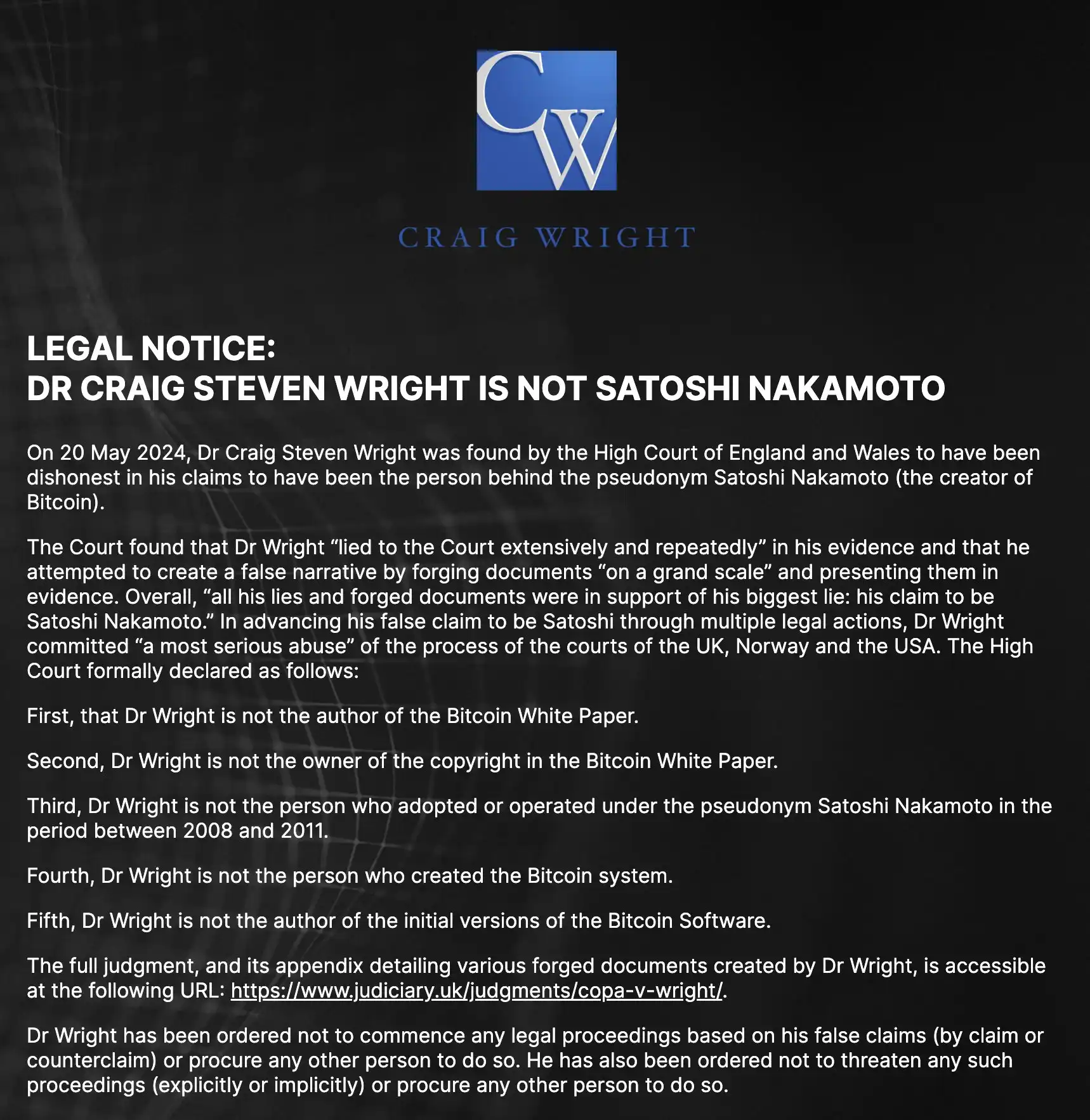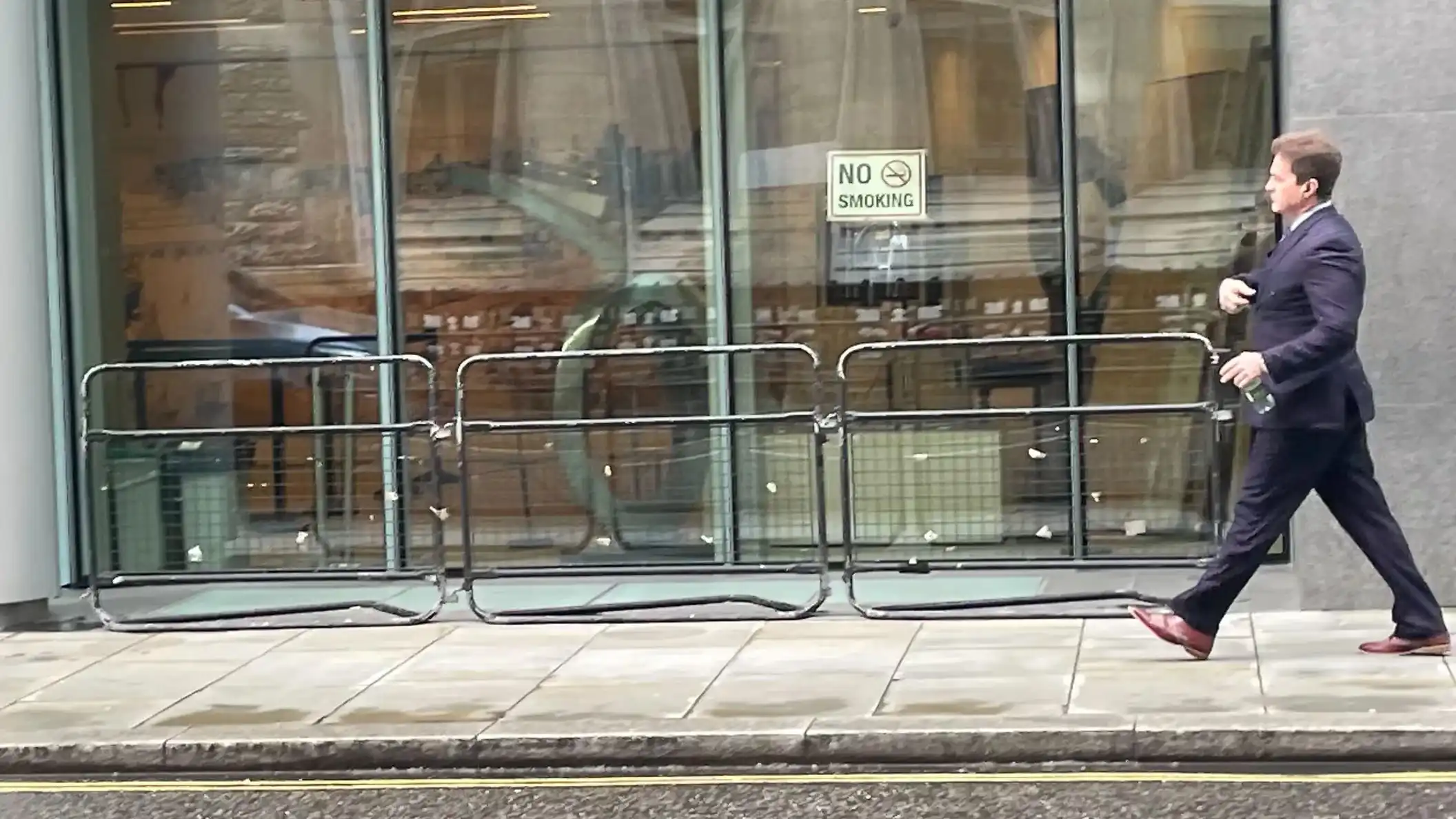Original Author: Luccy
After a legal battle lasting for 2 months, "澳本聪" Craig S. Wright (referred to as CSW) officially made a public statement today, admitting that he is not Satoshi Nakamoto.
Since December 8, 2015, when Craig Wright first claimed to be Satoshi Nakamoto, he has been using this identity frequently in public. On May 20 this year, the High Court of England and Wales made a significant ruling, clearly stating that Craig Wright is not the founder of Bitcoin, Satoshi Nakamoto.
According to the court's ruling, Craig Wright has promoted his false identity through various legal means in the UK, Norway, and the United States. The court described his behavior as "a serious abuse of the judicial process." The court conducted a detailed review of Craig Wright's statements and evidence, finding that he "frequently and repeatedly lied" when providing evidence and attempted to support his false claims through "massive forgery of documents." The final ruling determined that Craig Wright's claim to be Satoshi Nakamoto was fraudulent.

"Craig Wright" has long been targeted by the court
The identity of Bitcoin developer Satoshi Nakamoto has always been a mystery. Although many people have claimed to be Satoshi Nakamoto, it is probably difficult to find a second person as "persistent" as Craig Wright. Therefore, "澳本聪" Craig Wright's long-term activities under the identity of Satoshi Nakamoto have burdened him with various legal "debts."
In April 2021, COPA sued Craig Wright, accusing him of "massive forgery" in attempting to prove himself as Satoshi Nakamoto, questioning the legitimacy of his claim to own the copyright of Bitcoin.
Note: COPA refers to the Cryptocurrency Open Patent Alliance, established in 2020, a non-profit organization. COPA is dedicated to promoting the adoption and advancement of cryptocurrency technology and eliminating barriers to industry growth and innovation caused by patents. Its members include 33 institutions such as Coinbase, Block, Meta, MicroStrategy, Kraken, and cryptocurrency participants such as Twitter founder Jack Dorsey.
However, so far, his various lawsuits have never focused on revealing his anonymous identity as Satoshi Nakamoto, but on ensuring that Bitcoin remains true to its core principles. To maintain the continuity of these principles, Craig Wright has filed a copyright claim against "Bitcoin developers" and made a non-negotiable settlement proposal. This settlement proposal preserves Wright's goal of maintaining the integrity of the original Bitcoin system, while limiting unnecessary costs for all parties in lengthy high court trials.
To clearly demonstrate his sincerity in the proposed settlement, Wright has agreed to relinquish his rights and copyrights related to the BTC, BCH, and ABC databases and provide opponents who control, operate, and/or own these databases with a permanent and irrevocable license to encourage open commercialization of technology in a competitive and fair market, respecting and utilizing intellectual property rights. He hopes that this proposal will enable them to compete fairly with BSV.
It is worth noting that the core principles of Bitcoin maintained by Craig Wright are elaborated in the Bitcoin white paper, but the final court ruling shows that Craig Wright is not the author of the Bitcoin white paper, nor the owner of the copyright of the Bitcoin white paper.
As the settlement terms proposed by Craig Wright did not receive the consent of all parties involved, the trial against Craig Wright continues. On January 24, "澳本聪" Craig Wright stated in his personal blog that he would face a group of individuals and corporate entities in the High Court of London in February to defend his intellectual property as the creator of Bitcoin.
On February 13, during the trial in the High Court of England, COPA's lawyers continued to cross-examine Craig Wright for several days, demanding that he stop making "irrelevant allegations" and "answer questions." Craig Wright then accused COPA members of turning Bitcoin into a "speculative coin" scam.

Craig Wright arrives at the London court to attend the COPA trial. Image source: Dan Kitwood/Getty Images, coindesk
Meanwhile, Craig Wright himself has been accused of providing different versions of the same story in court. When Craig Wright protested, presiding judge James Mellor intervened, stating that the focus of the case was whether Wright is the pseudonymous author of the Bitcoin white paper. Subsequently, Craig Wright admitted** on February 23** that he had edited the version of the Bitcoin white paper submitted in the COPA trial. **
After testimony from early Bitcoin developers such as Martti Malmi, the judge concluded on March 14 that the overwhelming evidence indicated that Wright is not Satoshi Nakamoto.
Following the first-instance defeat, Craig Wright transferred some of his assets overseas, further raising concerns from COPA about his evasion of court fees. On March 30, the UK court, in response to COPA's request, approved a global freezing order on Craig Wright's assets worth £6 million (approximately $7.6 million).
No one ever believed Craig Wright
In 2019, Bitcoin user and podcast host Peter McCormack called Craig Wright a fraud and a scammer, stating that he "is not Satoshi Nakamoto." Craig Wright claimed that these comments caused him economic losses by not being invited to various events and conferences. In August, the judge concluded that Craig Wright provided false evidence in his claim, and therefore awarded him only a symbolic compensation of £1 ($1.23).
Not only did he fail to reclaim the identity of Satoshi Nakamoto, Craig Wright's copyright claim to the Bitcoin white paper was also revoked in the same year.
The Bitcoin white paper was released under the Massachusetts Institute of Technology (MIT) open-source license, allowing anyone to reuse and modify the code for any purpose. However, in 2019, Craig Wright registered the copyright of the Bitcoin white paper and its code in the United States. Subsequently, the court issued an injunction preventing Wright from making further copyright claims.
On October 1, 2023, Christen Ager-Hanssen, former CEO of nChain Group, stated on social media that "after reporting several serious issues to the nChain Group board, I immediately resigned as CEO of the company."
One of the reasons for Christen Ager-Hanssen's resignation was no longer believing that nChain's Chief Scientist Craig Wright is the creator of Bitcoin, and Hanssen subsequently released a screenshot of a report claiming to show evidence of Wright's browsing history contradicting his long-standing claim to be Satoshi Nakamoto.
Not only did he claim to be Satoshi Nakamoto, but Craig Wright even sued others in the name of Satoshi Nakamoto.
In early 2022, Craig Wright registered a new Twitter account with the bio "Creator of Bitcoin." Subsequently, Norwegian citizen Magnus Granath made harsh remarks about Craig Wright on social media, calling him a "fraud" and alleging that he had perpetrated a "scam," even creating the "#CraigWrightIsaFraud" hashtag.
Craig Wright and his team considered this defamation and demanded that Granath retract these statements and publicly apologize. Granath refused the apology request, and both parties sought court mediation, with the Norwegian judge supporting Granath's viewpoint. Subsequently, Craig Wright sought to appeal this defeat.
However, this matter continued until April 12 this year, perhaps due to his own uncertain identity as Satoshi Nakamoto, Craig Wright stopped his appeal against Granath after losing in the UK court.
Yesterday, UK judge James Mellor approved COPA's injunction, which will prohibit Craig Wright from suing others in the name of Satoshi Nakamoto. James Mellor also stated that he would refer Craig Wright to the Royal Prosecution Service for consideration of perjury charges.

Craig Wright at the COPA trial on March 1, source: Camomile Shumba, CoinDesk
In the end, Craig Wright lost this legal battle and today made a statement admitting that he is not Satoshi Nakamoto. The specific rulings of the High Court are as follows:
· Craig Wright is not the author of the Bitcoin white paper.
· Craig Wright is not the owner of the copyright of the Bitcoin white paper.
· Craig Wright is not the person who operated under the name of Satoshi Nakamoto from 2008 to 2011.
· Craig Wright is not the creator of the Bitcoin system.
· Craig Wright is not the author of the original version of the Bitcoin software.
The detailed judgment and appendices revealed various forgeries by Craig Wright. In addition, the court ordered Craig Wright not to initiate any legal proceedings based on his false claims or encourage others to do so, nor to explicitly or implicitly threaten to bring similar lawsuits.
In 2019, Craig Wright came to Beijing to attend the BSV Beijing conference. In an interview with BlockBeats, he stated that he did not care how others mocked him and reiterated that Bitcoin is not anonymous but private, and revolves around government regulation. He also provided his assessment of BTC, Ethereum, and many other projects. He also stated that people who advocate "democratizing finance" are frauds and bluntly stated that the crypto industry is a scam, including many projects such as Tron and Akon.
Related reading: "Exclusive Interview with CSW: If I were to compare myself to a historical figure, I would choose Edison"
This legal battle ended with Craig Wright's defeat, and perhaps the identity of Satoshi Nakamoto is not important. What is important is the groundbreaking invention of Bitcoin and the foundational consensus it has laid for the crypto world. As the community says, "Anyone can be Satoshi Nakamoto, except Craig Wright."
免责声明:本文章仅代表作者个人观点,不代表本平台的立场和观点。本文章仅供信息分享,不构成对任何人的任何投资建议。用户与作者之间的任何争议,与本平台无关。如网页中刊载的文章或图片涉及侵权,请提供相关的权利证明和身份证明发送邮件到support@aicoin.com,本平台相关工作人员将会进行核查。




